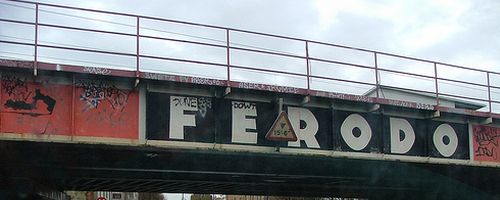
Picture by Ash Lourey: Camden High Street
By 2034 the process is complete: Camden Town has become Gothworld, Europe’s premier subcultural theme park, open 10am to 11pm with half-price entry every second Thursday.
Caraway is five years old, and very excited. Adrian, thirty-nine, argued for the robot zoo and lost, defeated by cries of “da-a-a-ad” elongated with as many extra syllables as it took. He pays the exorbitant entrance fee, and they’re ushered into a dark tunnel; aerial LEDs swarm toward them, dodging just in time, clustering and dissolving, moving into pairs, glowing eye-like. Caraway grips his hand tight and pulls him to a stop, then lets go and runs ahead while the LEDs part in front of her. He chases.
They come out in a wide stone square, refreshment stalls dotted along each side, streets leading off in five different directions. Milling crowds pose with the tall animatronic ravens, and in the centre the Mohawk Fountain rises. Thousands of glass tubes arc four metres into the air, each one throwing out a spray of water, coloured by lights that cycle through black, purple and red. A dozen visitors squat down between the fountain and their friends’ cameras, trying to find an angle that makes the sculpted glass emerge from their heads.
Caraway stares, mouth open, but the rudimentary programming of the animatronic ravens can’t distinguish awe from boredom, and two of them lumber her way. Her eyes grow wider and wider as they approach, extending their stubby wings; but then it’s all too much, and she backs away, groping for Adrian’s hand again.
“We’re all right, thanks,” Adrian says, and the ravens back away.
“I think,” Caraway says, “maybe I’ll like the ravens later, when I’m bigger.”
Adrian squats, and loads up the map. “So what do you think you’d like now? There’s Punkland, there’s Vampire Island, there’s the Mausoleum of Theodoric, there’s Leath— no, you’re probably not tall enough for that one. Cyberstreet?”
Caraway shakes her head. “I want to go on the Sock Slide,” she says, pointing down the nearest street. At the far end, Adrian can just make out two intertwined helter-skelters, one black and one red; only when they’re closer do cartoon cutouts explain to him that it represents a striped sock, traditional subcultural garb from the turn of the century.
After the Sock Slide, Caraway drags him to the Bauhaus of Fun, through the Nick Cave, and up the Stocking Ladder. At the top, they’re belted into place on a gently swaying platform. “We’re doing the goth dance, Dad!” Caraway calls out, giggling; Adrian feels slightly queasy.
Afterwards, on a boat trip, he looks down into the canal as it flows with blood. Halfway through they spring a leak, accompanied by carefully choreographed horror from their host; at the last minute the boat swings sideways and lands them on dry ground, just by a gift shop.
By the end of the day Caraway, exhausted, has run through all the savings on her pocketcard. She’s wearing a fluffy purple Corsette®, a strap-on mohawk, red braces, three plastic wedding rings, and a black ivy-leaf amulet that flashes pink in the dark. It has been, she declares as they leave, the best day ever, and Gothworld is her very favourite place.
Gothworld is, of course, haunted by the ghosts of the real goths. Mostly they cluster around Graveyard Corner, though sometimes they drift up and down between the stalls at Market Towne. They’re paid well above the national ghost average, and get 25 days holiday a year, plus Tuesday evenings off while the exorcist comes in to keep the Punktergeist population under control.




